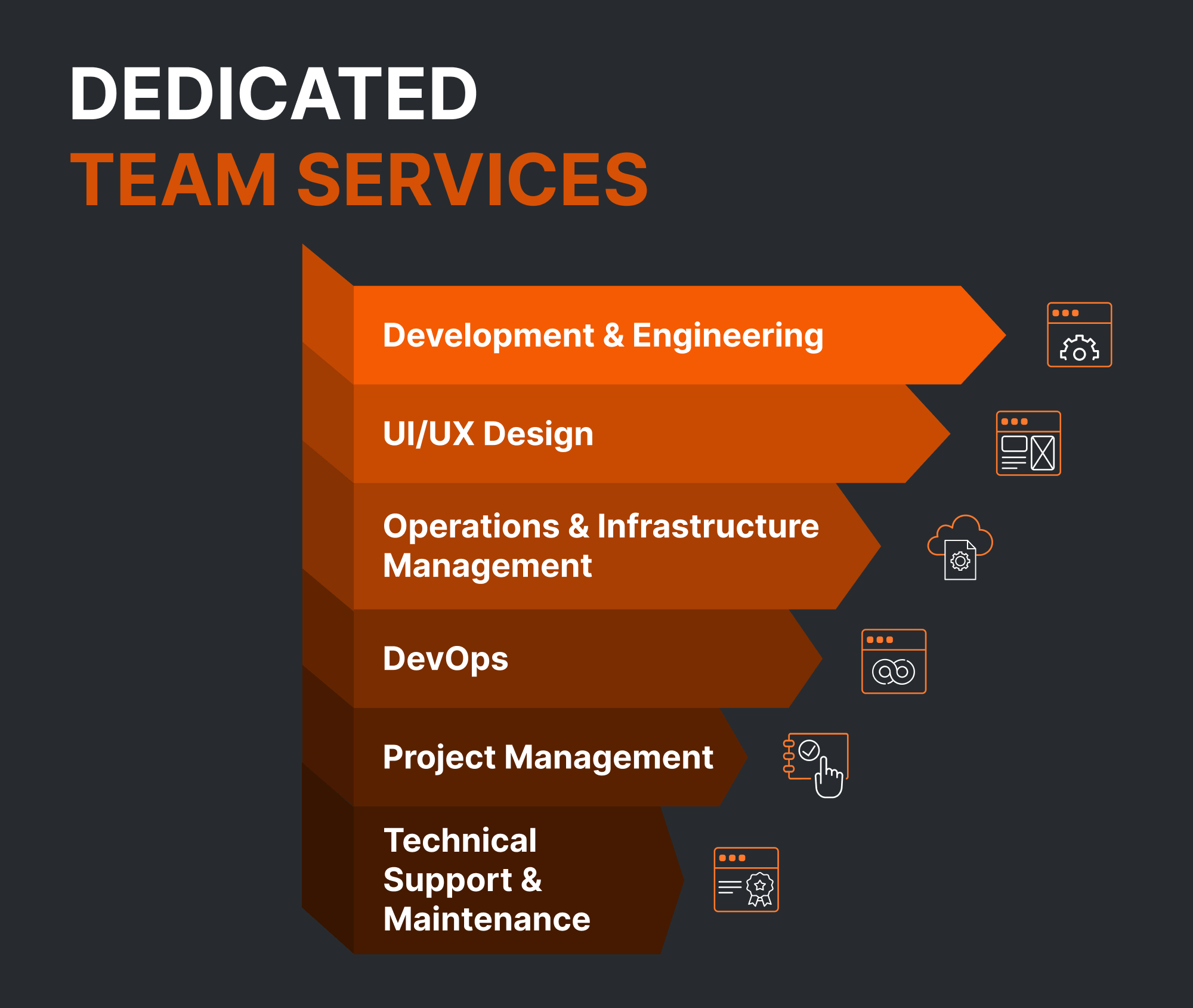The Ultimate Guide to Building Your Dedicated Development Team
Business
11/11/24
Read time: 18 min
Intro: Why the Right Team Can Make or Break Your Success
A lot has already been said about dedicated software development teams: they’re super valuable, can set you up for a home run, and, most importantly, can save you a boatload of cash!
However, many businesses looking to hire offshore dedicated developers usually have doubts.
Is this solution really that lucrative? Maybe all those dedicated development team providers are just trying to squeeze every dime they can!
Short answer: this cooperation model is among the absolute best!
Data supports our point: companies working with dedicated teams reduce development costs by up to 60% and accelerate time-to-market by 30%. But does this mean that every business choosing to outsource will reap such extraordinary benefits? Not necessarily, because you need to approach it with a keen eye.
Keep reading and become an expert in finding the most valuable asset you didn’t know you needed — people.
What is a Dedicated Development Team?
Put simply, a dedicated development team is a cooperation model between a client and a service provider. This model enables the first party to hire diverse experts (not just developers, contrary to popular belief) to work on a particular project for an extended time.
Consider the following situation. StyleCo, a mid-sized eCommerce company, decides to stay competitive by adding and supporting a number of cutting-edge virtual try-on functions to its online store. Can they hire cloud engineers, UI/UX designers, and AR developers one at a time? Absolutely!
But it could take months. In their case, choosing a dedicated development team is much more practical. They can get a team of carefully selected professionals consisting of a frontend developer with experience in AR shopping apps, a 3D modeler with experience in Hollywood movies, and even a DevOps specialist who automates high-traffic eCommerce systems in his sleep. In a few weeks, StyleCo is conducting live beta testing in addition to prototyping. The kicker?
They launched months ahead of their rivals and saved 40% of the cost it would have taken to build an in-house team. That’s what it means to have your ideal team available whenever you need them.
How Does a Dedicated Development Team Model Work?
First, it’s critical to understand if this model is the right fit for your needs.
A dedicated software development team is a must-have for you, if:
- you don’t have an in-house team or it doesn’t cover all your needs;
- you’re working on a long-term project;
- your project requires specific or rare skills you can’t find locally;
- you’re planning to expand globally;
- you’re revamping an aging ecosystem that requires a fresh outlook.
Once a business is 100% sure it needs a dedicated development team, it needs to start looking for a trusted vendor that looks for the best experts based on the project needs. After interviewing, the newly established team reads documentation and gets acquainted with the scope to fully understand the project’s goals. Finally, once the onboarding is completed, you get a team that has fully emerged in your project along with fast results.
With a dedicated development team model, you get a flexible, reliable, highly specialized team working on your project just like an in-house unit. It is a long-term solution developed to give you full control, expert input, and the ability to scale without administrative headaches.
In essence, you will get the best of both worlds: the quality and commitment of an internal team with the flexibility and cost-effectiveness of outsourcing.
Common Dedicated Development Team Services
Dedicated development teams serve multiple purposes — from development and design to project management, you can choose experts for any needs. But most often, businesses hire dedicated software development teams for:

1. Development & Engineering
Development is often thought of as simply writing code, but more important and at least as overlooked is strategic engineering for scale and future-proofing. A professional development team doesn’t build for today; they make sure your software can scale to exponential growth with minimal rebuilds. When companies underestimate how much modular architecture is needed, they get themselves into “technical debt”. This is a hidden cost that results from opting for easy-to-implement but myopic solutions. A dedicated team helps you evade this by ensuring systems are designed to grow with your business.
2. UI/UX Design
A dedicated UI/UX team can do much more than make things “look good”. They can drastically reduce customer churn. Reducing friction in micro-interactions — such as making a button more easily tapped or immediately providing visual feedback leads to large increases in user engagement. According to research, every dollar invested in UX returns $100. This is not about making things look and feel pretty; rather having psychology and behavior flow into designs that organically guide users toward conversions.
3. Operations & Infrastructure Management
Operations extend a great deal beyond server management: workflow efficiencies, disaster recovery plans, and even cost optimizations of cloud services. Many businesses end up spending a lot more than they should on cloud infrastructure because they didn’t build proper scaling strategies. The good thing is that all autoscaling solutions can be implemented by a dedicated development team. You pay for server capacity when it’s required, which may save up to thousands of dollars in operating costs per year. They manage redundancy and back-ups; hence, you won’t face massive losses for downtimes.
4. DevOps
The real power of DevOps is not about faster deployments, but rather in the reduction of human error. With automated testing, integration, and deployment, it’s a lot harder for a bug to make its way into production. According to Atlassian, companies with dedicated DevOps teams can deploy 30X more frequently and recover from failures 168x faster. As a result, you get reliability, avoiding those big PR disasters coming from failed software updates.
5. Project Management
A project manager is more than a coordinator; he’s a guardian against scope creep. Even with the most thought-out projects, without a strong PM, projects spiral into never-ending feature adds and delayed deadlines. A dedicated PM can introduce agile methodologies, allowing for much better sprint planning and iterative feedback loops. Ensuring the product’s constant refinement by hiring a dedicated offshore team is a wise decision.
6. Technical Support & Maintenance
The biggest value of technical support is in proactive monitoring. Dedicated teams can put in place monitoring tools that detect issues before they are user-facing. They install alert systems to receive early warnings in case of server overloads or software vulnerabilities and fix them urgently. Likewise, regular maintenance means complying with security standards like GDPR and HIPAA, which, if ignored, will result in costly penalties.
When a Dedicated Development Team Model is the Right Call
1. Specialized Skills
What most businesses don’t realize is that a committed team lets them plug into a versatile talent pool without long-term commitments. Imagine having instant access to a blockchain expert, an AI specialist, and a DevOps pro in one go. This ability lets companies scale operations across more grounds than they ever could if they started building a team from scratch.
2. High Cost of Failure
Failure affects more than just the project at hand. It can have a knock-on effect on your company’s reputation, customer base, and potential earnings. Having an offshore dedicated team reduces this risk further because you are covered by experts who have previously overcome such challenges. In industries like FinTech or healthcare, a single mistake can cost your organization millions in terms of lost revenue or compliance penalties.
3. Last Chance to Get It Right
This isn’t just any team. When a project is in critical condition, a dedicated software development team may be your last chance. It’s like a SWAT team for development called in for rescue when the stakes are sky-high and failure is not an option.
4. Borrowed Expertise
The aha! moment here is that you are borrowing skills but also tested processes. Dedicated teams come equipped with methodologies, best practices, and industry insights that go beyond the mere completion of tasks. They have the capacity to future-proof your project. In a way, it’s like getting a strategic layer coming bundled along with the talent you hire.
5. Turnkey Product Development
Many believe building a product means starting with nothing, but with a dedicated team, you get a fully operational system. You don’t have to put the pieces together on your own. Instead, an entire product shows up, fully formed, without you ever needing to touch code or any team dynamics management.
6. Time to Market Becomes Critical
It’s frequently overlooked that being first might mean the difference between dominating the industry and falling behind. Working with offshore dedicated developers accelerates the process while keeping quality uppermost, enabling one to launch faster than competitors and capture market share at its most crucial period.
7. Complex Software Development
The real advantage comes when you’re faced with challenges that only diverse deep experience can solve. They bring systems thinking in, including complex software, whether enterprise-level, AI-driven, or integrations heavy with legacy systems. With the right experts working for you, everything becomes manageable, seamless, and scalable.
8. Vague, Unclear, Ever Changing Requirements
The best part is that an engaged team thrives on uncertainty. Agile and iterative in nature, they can easily pivot on changing requirements with ease, avoiding chaos which normally comes when trying to adapt an in-house team. This approach means you will not have to make a choice between flexibility and quality.
Differences Between Dedicated Development Team, Fixed Price, Time & Material
There are three most common cooperation models when it comes to software development outsourcing: dedicated development team, fixed price, and time & material. Want a match made in heaven? Understand your project and pick one accordingly.
A dedicated development team model involves outsourcing a full team working only on your project full-time. Normally, the cost would be determined based on the size of the team and the duration of the project. It is very flexible, hence more suitable for long-term projects or where your requirements are constantly changing. However, this model requires continuous client engagement, because the team needs feedback and guidance from the very beginning to the end of the project life cycle.
The fixed price model works well for smaller projects with well-defined requirements. It closes the price at the very beginning of the project through negotiations about which scope needs to be developed. The upside of this model is that you know exactly what you pay upfront, which makes it easier to budget. However, any changes or unforeseen challenges along the way can result in disputes or extra costs. It is the least flexible model and quite risky since the project’s success relies on the accuracy of the initial requirements.
If choosing the third model, you pay for actual time and material consumed to complete the work. This is best for projects in which the scope is poorly defined or may change over time. This model provides more flexibility than the fixed-price model but at the expense of the predictability of the budget. It is usually hard to estimate the final cost because it depends on how many hours were spent by the team and how many more resources are needed. This model provides more control to the clients in terms of project progress. It enables frequent changes while also requiring regular involvement and monitoring.
Benefits of a Dedicated Software Development Team
After covering why this model works for many projects, proving it’s quite popular, and explaining how it works, it’s high time we understand why this revolutionary approach to building software is still relevant after all these years. Well, the benefits speak for themselves.
First of all, hiring a dedicated software development team is cost-efficient. Employing dedicated teams can help businesses save development costs by as much as 60% and, on average, speed up time to market by 30%. Why? Because service providers help you assemble a team of offshore dedicated developers from much more affordable locations.
For example, a developer from the US can cost you around $9,320 monthly, while the average price for the same expert in Ukraine is $3,250.
Secondly, the model is flexible. You can easily scale the team up or down in case the project needs to change. Next, when opting for this model, you can be certain you get to work with experts who have similar experience. This essentially means your project is in safe hands.
Finally, under the dedicated development team model, you get a stable and long-term partnership. The team you assemble works exclusively on your project. Over time, this partnership fosters trust, efficiency, and strategic alignment, crucial for ongoing growth and innovation. You develop a solid, friendship with the people passionate about your project the same way you are.
How to Choose a Dedicated Team of Developers?

1. Document the Use Case
Clearly define the scope and goals of your project even before beginning any search. When you document the use case, the potential vendors understand your needs and hence provide the right solution. It helps narrow down your options and avoids misunderstandings or wastage of resources when evaluating the fit of the team.
2. Choose a Location to Hire Dedicated Development Team
Location is another critical consideration in choosing a team. Although some companies hire nearshore or offshore teams to save money without giving up on quality, you will have to consider time zone differences, cultural compatibility, and language skills. For example, when hiring offshore dedicated developers in Eastern Europe, you’ll benefit from affordability and high levels of professionalism. Latin America, on the other hand, offers proximity, which North American companies appreciate most.
3. Make a List of Potential Vendors
Research a list of potential vendors based on their portfolios, customer testimonials, and case studies. Look at experiences related to your specific industry or projects. It will enable you to ensure you choose among the most qualified candidates with proven track records. You can go to Clutch, GoodFirms, Upwork, YouTeam, DesignRush, and others.
4. Pay Attention to Work Methodology
Consider the work methodology followed by the outsourcing vendor: Agile, Scrum, or Waterfall. More often than not, Agile is the most flexible and adaptive for ongoing projects since one gets iterative feedback on the tasks executed. The methodology used by your chosen company should be in tandem with how one plans to manage the project for smooth collaboration and communication.
5. Scrutinize Expertise & Experience
A company with relevant experience, either within your particular industry or with similar technologies, is critical to the success. Check the vendor’s work for deep technical expertise and the ability to address intricate requirements. Besides, look for partners with continuous learning and skill development of their staff. These indicators ensure they keep current with evolving technologies.
6. Check Market Reputation
Finally, don’t underestimate the factor of market reputation. Reviews, ratings, and third-party endorsements via platforms like Clutch will help you justify why your selected vendor is credible. If a company has managed to build a strong reputation, that means they have delivered quality several times and have met client expectations. This is what you’re looking for! Only after a thorough check consider partnering with the vendor. Good luck!
Wrapping Up
Starting a new project is always exciting, yet many challenges can come along the way even before your product reaches the market. You can only achieve success if you work with the right people. According to the McKinsey report, people are the most valuable resource, hence business executives must prioritize the IT talent strategy. Let’s drop the buzzwords and keep it real — a lot of thought and skill go into the hands behind the scenes, pushing the buttons to turn your vision into reality. Hiring a dedicated software development team in 2024 isn’t easy — yet it’s worth it!
FAQs
What’s a dedicated development team?
This is a perfect model for long-term projects. Essentially, you hire remote IT professionals, and they work exclusively for you. This model is perfect for those who don’t have an in-house team or require rare expertise to help your project stand out.
Why hire a dedicated software development team?
It’s cost-effective, flexible, and helps you choose from a wider talent pool. Plus, all the hiring and administrative tasks are covered by the outsourcing vendor.
How much does it cost to hire offshore dedicated developers in 2024?
The prices for offshore dedicated developers in 2024 years are different for every region. They typically start from $15 to $80 per hour. An Eastern European developer costs about $25-$60/hour, while Latin America and Asia have similar rates. Generally, Asia has the cheapest rate at $15-$40/hour. The monthly costs of a full-time developer will be in a range from $2,000 to $8,000 depending on the location and the expertise level.




